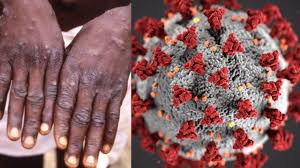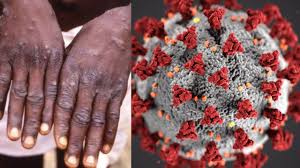
A huge monkeypox outbreak has expanded to at least 20 nations, prompting some notable infectious disease experts to call for speedier action from global health authorities to contain it.
They argue that governments and the World Health Organization should not repeat the COVID-19 pandemic's early blunders, which delayed case detection and allowed the virus to spread.
While monkeypox is not as contagious or dangerous as COVID, these researchers believe that clearer information on how to isolate a person infected with monkeypox, more explicit advice on how to safeguard those who are at risk, and enhanced testing and contact tracing are all needed.
"If this becomes endemic (in more countries), we will have another nasty disease and many difficult decisions to take," said Isabelle Eckerle, a professor at the Geneva Centre for Emerging Viral Diseases in Switzerland.
According to Reuters, the WHO is evaluating whether the epidemic could be classified as a possible public health emergency of international concern (PHEIC). A declaration by the WHO that an outbreak is a global health emergency, like it was with COVID or Ebola, would assist speed up research and financing for disease containment.
"It is always under consideration, but no emergency committee as yet (on monkeypox)," Mike Ryan, director of the WHO's health emergencies programme, said on the sidelines of the agency's annual meeting in Geneva.
Experts say the WHO is unlikely to reach such a determination anytime soon because monkeypox is a known threat that the world has instruments to combat. WHO officials indicated that debating whether to form an emergency committee, the group that advises declaring a PHEIC, is part of the agency's usual reaction.
Even without an emergency declaration, Eckerle wants the WHO to encourage countries to implement more coordinated and strict isolation measures. She is concerned that claims that the virus is mild, as well as the availability of vaccines and treatments in some countries, "may lead to lax public health behaviour."
This month, more than 300 suspected and confirmed cases of monkeypox have been reported, a normally mild infection that spreads through close contact and causes flu-like symptoms and a characteristic rash.
The majority of cases have occurred in Europe rather than in the endemic areas of Central and West Africa. In the present outbreak, no deaths have been reported.
Global health professionals, on the other hand, have raised concern about the rising outbreak in non-endemic countries. According to the WHO, as surveillance improves, numbers are expected to climb.
Monkeypox is not the same as SARS-CoV-2, the new coronavirus, according to Angela Rasmussen, a virologist at the University of Saskatchewan in Canada, who noted on Twitter that "we are making some of the same mistakes with regard to responding decisively with the instruments at hand."
The WHO underlined on Friday that the monkeypox virus may be contained using measures such as early detection and isolation of cases, as well as contact tracing. find out more
Infected persons - and their close connections in some circumstances - are recommended to isolate for 21 days, but it's unclear how many people will stick to such a long period away from work or other obligations. According to Eckerle, lab capacity to screen for monkeypox is not yet extensively established, making timely diagnosis challenging.
Although mass vaccination is not recommended, several countries, such as the United Kingdom and France, are providing vaccines to healthcare personnel and close relatives.
According to some experts, the existing reaction is proportionate, and calling monkeypox a global health emergency and establishing a PHEIC at this time would be incorrect.
"This is reserved for threats with the highest level of risk based on infectivity, severity and international risk of escalation," said Dale Fisher, chair of the Global Outbreak Alert and Response Network (GOARN) and a professor of medicine in Singapore.
Beyond labels, researchers say the most crucial takeaway from the last two years is that it's too late to stop pandemics once they've started spreading.
"It is always disappointing when the world wakes up to a new disease only when it hits high-income countries," said Piero Olliaro, a professor of poverty-related infectious diseases at Oxford University and monkeypox expert.
To prepare for pandemics, "you have to do that where the diseases are now," he said.
(Source:www.business-standard.com)
They argue that governments and the World Health Organization should not repeat the COVID-19 pandemic's early blunders, which delayed case detection and allowed the virus to spread.
While monkeypox is not as contagious or dangerous as COVID, these researchers believe that clearer information on how to isolate a person infected with monkeypox, more explicit advice on how to safeguard those who are at risk, and enhanced testing and contact tracing are all needed.
"If this becomes endemic (in more countries), we will have another nasty disease and many difficult decisions to take," said Isabelle Eckerle, a professor at the Geneva Centre for Emerging Viral Diseases in Switzerland.
According to Reuters, the WHO is evaluating whether the epidemic could be classified as a possible public health emergency of international concern (PHEIC). A declaration by the WHO that an outbreak is a global health emergency, like it was with COVID or Ebola, would assist speed up research and financing for disease containment.
"It is always under consideration, but no emergency committee as yet (on monkeypox)," Mike Ryan, director of the WHO's health emergencies programme, said on the sidelines of the agency's annual meeting in Geneva.
Experts say the WHO is unlikely to reach such a determination anytime soon because monkeypox is a known threat that the world has instruments to combat. WHO officials indicated that debating whether to form an emergency committee, the group that advises declaring a PHEIC, is part of the agency's usual reaction.
Even without an emergency declaration, Eckerle wants the WHO to encourage countries to implement more coordinated and strict isolation measures. She is concerned that claims that the virus is mild, as well as the availability of vaccines and treatments in some countries, "may lead to lax public health behaviour."
This month, more than 300 suspected and confirmed cases of monkeypox have been reported, a normally mild infection that spreads through close contact and causes flu-like symptoms and a characteristic rash.
The majority of cases have occurred in Europe rather than in the endemic areas of Central and West Africa. In the present outbreak, no deaths have been reported.
Global health professionals, on the other hand, have raised concern about the rising outbreak in non-endemic countries. According to the WHO, as surveillance improves, numbers are expected to climb.
Monkeypox is not the same as SARS-CoV-2, the new coronavirus, according to Angela Rasmussen, a virologist at the University of Saskatchewan in Canada, who noted on Twitter that "we are making some of the same mistakes with regard to responding decisively with the instruments at hand."
The WHO underlined on Friday that the monkeypox virus may be contained using measures such as early detection and isolation of cases, as well as contact tracing. find out more
Infected persons - and their close connections in some circumstances - are recommended to isolate for 21 days, but it's unclear how many people will stick to such a long period away from work or other obligations. According to Eckerle, lab capacity to screen for monkeypox is not yet extensively established, making timely diagnosis challenging.
Although mass vaccination is not recommended, several countries, such as the United Kingdom and France, are providing vaccines to healthcare personnel and close relatives.
According to some experts, the existing reaction is proportionate, and calling monkeypox a global health emergency and establishing a PHEIC at this time would be incorrect.
"This is reserved for threats with the highest level of risk based on infectivity, severity and international risk of escalation," said Dale Fisher, chair of the Global Outbreak Alert and Response Network (GOARN) and a professor of medicine in Singapore.
Beyond labels, researchers say the most crucial takeaway from the last two years is that it's too late to stop pandemics once they've started spreading.
"It is always disappointing when the world wakes up to a new disease only when it hits high-income countries," said Piero Olliaro, a professor of poverty-related infectious diseases at Oxford University and monkeypox expert.
To prepare for pandemics, "you have to do that where the diseases are now," he said.
(Source:www.business-standard.com)














